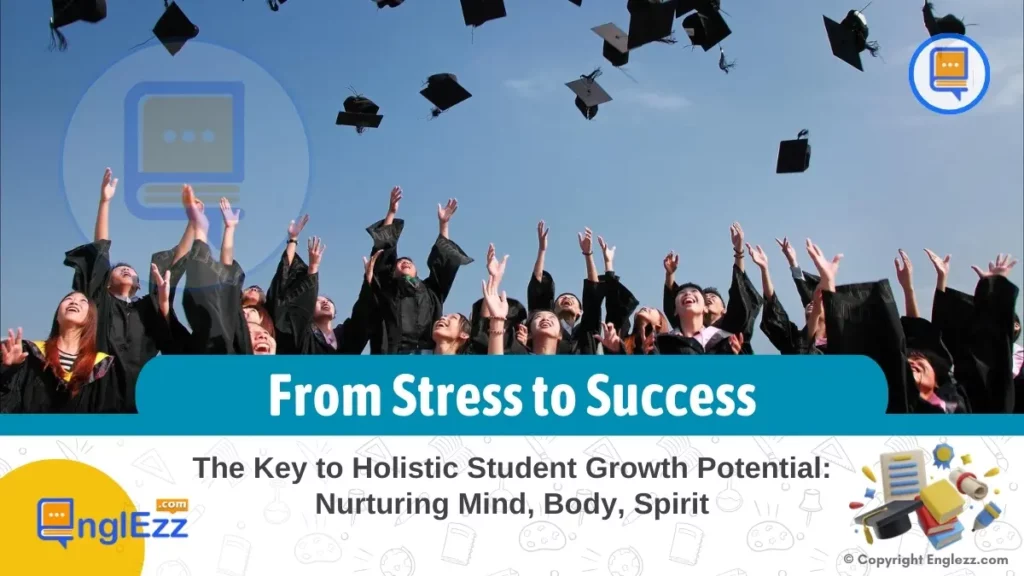In the intricate tapestry of student growth, where each thread represents a unique facet of development, lies the essence of holistic education. To truly unlock the boundless potential residing within every learner, we must tread beyond conventional confines and embrace a comprehensive approach—nurturing not just the mind’s thirst for knowledge, but also tending to the body’s vitality and awakening the spirit’s resilience. Achieve holistic student growth by prioritizing mind, body, and spirit wellness. Unveil the key to unlocking academic success and personal development.
It is in weaving together these three essential strands – mind, body, and spirit – that we unveil a pathway to profound transformation and unbridled success for our students.
The Key to Holistic Student Growth: Nurturing Mind, Body, and Spirit
Gone are the days when academic achievements stood as solitary pillars of accomplishment. Today’s educational landscape calls for a paradigm shift—an unwavering commitment to nurturing all dimensions of student well-being to sow seeds of holistic growth. Beyond test scores and grades rests a realm where critical thinking intertwines with physical health, where empathy blooms alongside intellectual curiosity.

This paradigm shift beckons educators, school administrators, and parents alike to embark on a journey that transcends textbooks — a transformative odyssey that celebrates the interconnectedness of mind, body, and spirit in sculpting resilient, well-rounded individuals poised to leave an indelible mark on the world stage. Join us as we illuminate this transformative voyage that holds the key to unlocking not just student potential but their very essence — illuminating minds, invigorating bodies, and nurturing spirits into a harmonious symphony of growth unparalleled before.
Mind: Intellectual Development
In the realm of intellectual development, nurturing students’ minds goes far beyond the transmission of information; it entails guiding them in honing critical thinking skills, problem-solving abilities, and fostering creativity. One valuable approach is through project-based learning, where students engage in real-world challenges that require them to think critically, collaborate effectively, and innovate solutions. By incorporating this method, educators not only enhance cognitive development but also instill a sense of purpose and relevance in their learning journey.
Create an inclusive environment where students feel safe to express themselves authentically and receive support from peers and educators alike. Encouraging open dialogues about mental health, offering mentorship programs, or organizing community service activities can all contribute to building a positive school culture that nurtures the mind, body, and spirit of every student. By prioritizing empathy, kindness, and cooperation in your educational setting, you lay the foundation for holistic growth and long-term success for your students.
Innovative teaching methods play a pivotal role in cultivating intellectual growth. For instance, technology integration can offer dynamic platforms for interactive learning experiences that cater to various learning styles. Virtual simulations and gamified activities stimulate students’ curiosity and engagement while sharpening their analytical thinking skills. Additionally, promoting interdisciplinary studies can spark connections between different subject areas, encouraging students to approach problem-solving from diverse perspectives.
Ensuring mental well-being among students is equally crucial in nurturing their intellectual development. Schools can establish counseling services, mindfulness programs, and stress management resources to support students facing academic pressures or personal challenges. By creating a safe space for emotional expression and providing coping strategies for mental health concerns, educators contribute significantly to enhancing students’ overall well-being alongside their intellectual aptitude. This holistic approach paves the way for a balanced educational experience that prioritizes both academic achievement and emotional resilience.
Body: Physical Wellness
In the realm of holistic student growth, fostering physical wellness is as crucial as nurturing intellectual development. Schools play a pivotal role in promoting overall health and wellness through robust physical education programs that go beyond traditional sports to encompass activities that cater to different interests and abilities. For example, integrating dance, yoga, or adventure sports not only enhances physical fitness but also instills a love for movement and self-expression in students, tapping into the mind-body connection.
Encouraging healthy lifestyle choices among students involves more than just teaching them about nutrition and exercise; it entails creating a culture that values well-being. Schools can organize workshops on meal planning, cooking nutritious recipes together, or even planting a school garden to educate students on where their food comes from. By involving students actively in these processes, schools cultivate a deeper understanding of the importance of nourishing the body for optimal performance and growth.
Creating a supportive environment that prioritizes physical fitness goes hand-in-hand with enhancing academic achievement and emotional well-being. When schools invest in playground equipment redesigns, offer mindfulness activities like nature walks or meditation sessions, or promote inclusive sports programs that celebrate diversity and teamwork, they send a powerful message to students that their physical health matters as much as their mental acuity. By weaving physical wellness into the fabric of daily school life, educators not only set students up for success academically but also equip them with lifelong habits for sustained well-being.
Spirit: Emotional and Spiritual Nurturing
In the realm of student growth, nurturing the spirit is a pivotal element often overlooked in traditional education models. By focusing on emotional intelligence, resilience, and self-awareness, educators can empower students to navigate challenges with grace and confidence. Imagine a classroom where conflicts are opportunities for growth, where setbacks are viewed as stepping stones toward success—a space where empathy, compassion, and positive relationships thrive. Cultivating these traits not only shapes better individuals but also fosters a harmonious school community built on understanding and support.
Introducing mindfulness practices can serve as a transformative tool in helping students develop inner peace and spiritual well-being. Picture students taking a moment to pause and center themselves amidst their busy academic schedules—learning to manage stress, connect with their emotions, and appreciate the present moment. By incorporating mindfulness exercises into daily routines, educators provide students with invaluable skills that extend far beyond the classroom walls. This practice equips them with tools to navigate life’s uncertainties with clarity and resilience.
One inspiring approach to promoting emotional well-being is through peer support programs where older students mentor younger ones. This creates a sense of belonging, fosters empathy, and strengthens bonds within the school community. Additionally, implementing initiatives that encourage acts of kindness or gratitude can further nurture a culture of positivity and emotional connectedness among students. By weaving these elements into the fabric of education, schools not only enhance academic outcomes but also prioritize the holistic development of each student—mind, body, and spirit—as they journey towards unlocking their full potential.
Implementing Holistic Student Support Systems
In the quest to nurture students holistically, educational institutions play a pivotal role in establishing comprehensive support systems that cater to diverse student needs. By creating an environment that values not just academic achievement, but also mental, physical, and emotional wellness, schools can foster a culture where every aspect of a student’s development is prioritized. For instance, incorporating mindfulness practices into daily routines can help students cultivate inner peace and resilience, equipping them with valuable tools to navigate the complexities of modern life.
Implement programs that teach students practical self-care techniques like deep breathing exercises, mindfulness practices, or time-management skills. By equipping students with these tools from a young age, they can better manage stress, cultivate emotional resilience, and nurture their spiritual well-being. For example, incorporating short meditation breaks into the school day can help students recharge mentally and emotionally to enhance their overall performance and happiness.
Collaboration between educators, administrators, and parents is essential in ensuring a unified approach towards nurturing students’ mind-body-spirit balance. When school communities work together harmoniously, they form a strong foundation for students to thrive. Imagine a school where teachers weave discussions on empathy and emotional intelligence into their lessons while parents reinforce these values at home; such synergy creates a holistic support system that enhances the overall growth of students.
Integrating interdisciplinary lessons that intertwine elements of mind, body, and spirit offers students a well-rounded educational experience. For example, a science class discussing the effects of exercise on the brain not only promotes physical wellness but also highlights the interconnectedness of various aspects of human development. By infusing traditional subjects with holistic principles, educators empower students to see the world through a multidimensional lens, fostering curiosity and understanding beyond conventional boundaries.
By implementing these holistic support systems in educational settings, schools pave the way for students to flourish not just academically but as well-rounded individuals ready to face the challenges of life with resilience and grace. In embracing this approach collectively – encompassing mental health resources, collaboration with families, and interdisciplinary teachings – educators lay the groundwork for unlocking each student’s full potential in mind, body, and spirit.
Measuring Success: Evaluating Holistic Growth
In the realm of holistic student growth, evaluation becomes a crucial component in understanding the impact of nurturing mind, body, and spirit. Schools are increasingly recognizing the need to develop specific metrics and assessment tools that go beyond traditional academic performance indicators. By tailoring these tools to measure progress in mind-body-spirit development, educators gain deeper insights into students’ overall well-being and personal growth. For instance, assessments may include not only academic achievements but also emotional intelligence markers, physical health progress, and spiritual awareness milestones. This multi-dimensional evaluation approach provides a comprehensive view of students’ holistic development.
Beyond external assessments, self-reflection plays a significant role in fostering holistic growth among educators and administrators themselves. Encouraging introspection on their teaching practices, support systems, and the overall school environment can lead to positive shifts towards a more holistic approach to education. Through reflective exercises and professional development opportunities centered around nurturing mind, body, and spirit in students, educators become catalysts for transformative change within educational institutions. By embracing continuous learning and self-improvement, they model lifelong growth for their students.

To inspire others in the educational community towards embracing holistic approaches, sharing success stories from schools that have implemented such strategies proves invaluable. These narratives serve as beacons of hope and motivation for other institutions seeking to enhance their students’ well-rounded development journey.
Highlighting case studies where holistic approaches have led to improved academic performance, enhanced emotional resilience, and stronger community bonds showcases the tangible benefits of prioritizing mind-body-spirit growth in education. By amplifying these success stories through conferences, publications, or online platforms, schools can ignite a ripple effect that propels the wider adoption of holistic student support strategies across various educational settings.
Empowering Holistic Student Growth
In conclusion, nurturing the mind, body, and spirit collectively is the cornerstone of unlocking students’ full potential. By acknowledging that holistic development encompasses intellectual growth, physical wellness, and emotional/spiritual nurturing, educators, school administrators, and parents can provide a comprehensive support system for students. Embracing this holistic approach goes beyond traditional academic achievements; it empowers students to thrive in all aspects of their lives.
Encourage cross-disciplinary projects that incorporate elements of mind, body, and spirit. For instance, a science lesson on the human digestive system could be paired with a cooking class where students prepare nutritious meals to understand the connection between food and health. This approach not only enhances academic learning but also promotes holistic well-being by fostering a deeper understanding of how different aspects of life are interconnected.
When schools prioritize holistic student growth, they create environments where students feel valued and supported. For example, integrating mindfulness practices not only enhances mental well-being but also fosters a sense of inner peace that can positively impact academic performance and behavior. Moreover, by promoting physical wellness through engaging physical education programs and encouraging healthy lifestyle choices, schools equip students with the tools they need to lead balanced lives.
Inspiring educators, school administrators, and parents to adopt holistic approaches is crucial in creating a community dedicated to nurturing students’ diverse developmental needs. Schools that successfully implement these strategies witness firsthand the profound impact on student outcomes—academic excellence coupled with emotional intelligence leads to well-rounded individuals ready to face challenges with resilience and confidence. Ultimately, by prioritizing the interconnected growth of mind, body, and spirit in students, we pave the way for a brighter future filled with empowered learners who are equipped to succeed in all facets of life.
Empowering Holistic Student Growth
Embracing a holistic approach to nurturing students’ mind, body, and spirit is not merely an educational strategy; it is a philosophy that recognizes the interconnectedness of all aspects of a student’s well-being. By fostering intellectual development, physical wellness, and emotional/spiritual nurturing simultaneously, educators, school administrators, and parents pave the way for unlocking each student’s full potential. Through innovative teaching methods, supportive environments, and mindfulness practices, we create a comprehensive ecosystem that values every dimension of a student’s growth journey.
As we journey together in this noble cause of holistic student development, let us remember that every small effort contributes to monumental change. The ripple effect of nurturing a child’s mind, body, and spirit reverberates not just within the walls of our institutions but also out into the world they will one day shape. Let our collective commitment to holistic education be an enduring legacy that transforms not only individual lives but entire communities – inspiring generations to come with its profound impact.
FAQs:
1) Why is holistic student growth important?
Holistic student growth is vital because it acknowledges that students are multifaceted beings whose intellectual, physical, and emotional well-being are interconnected. By nurturing all these aspects concurrently, we unlock their full potential.
2) How can parents support holistic student development at home?
Parents can support holistic student development by encouraging healthy lifestyle choices for their children (such as balanced nutrition and regular exercise), creating a positive home environment that fosters emotional intelligence and resilience, and engaging in open communication with their children on various topics.
3) What role do innovative teaching methods play in holistic education?
Innovative teaching methods play a crucial role in engaging students’ minds creatively while also supporting their emotional and physical well-being. These approaches help make learning more immersive and impactful across all dimensions of student growth.
4) Is spiritual well-being essential in education?
Yes, spiritual well-being is essential in education as it encompasses qualities like self-reflection, empathy for others, resilience in facing challenges, and finding inner peace amidst life’s complexities – all crucial skills for navigating the world beyond academic realms.
5) How can schools measure success in supporting holistic growth?
Schools can measure success by developing metrics tailored to assess progress in mind-body-spirit development – tracking improvements in academics alongside indicators like students’ emotional intelligence levels or participation in physical activities. This multifaceted evaluation approach offers insights into how effectively schools are nurturing various facets of student growth.








